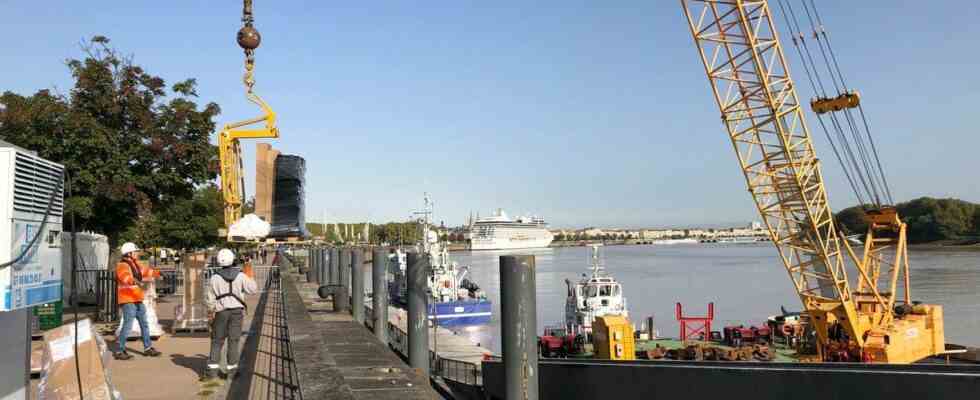A crane unloading foodstuffs on the quays of Bordeaux, you don’t see that every day. This Wednesday, a river freight test was organized by the metropolis and the city of Bordeaux with various actors, including the Garonne Fertile collective which brings together producers, transporters, restaurants, etc. Parcels coming from Lot-et-Garonne by river were handled by cargo bikes for the shortest journeys and vans for the longest. An exemplary alternative for managing the famous last kilometer, while reducing CO2 emissions and decongesting urban centers. After the June 2021 experiment, the idea is to get to the heart of the matter of river urban logistics, even if many obstacles remain to be overcome.
Quays designed for walking
“Is it technically possible to transport goods in Bordeaux? This is the question of the day”, sums up François Le Gac, director of the river mission in the Bordeaux metropolis. Three types of unloading were tested by positioning cranes from a boat, a pontoon and the quays. Various goods (materials, food parcels and waste) were also sent. If the Bordeaux quays had an economic vocation for a long time, they have since been redeveloped for walking and the docking of tourist boats. The flow of passers-by and soft transport will necessarily have to be taken into account, in a security component.
The UNESCO classification of the sector also complicates the development of possible unloading docks because the architect of the French buildings must give the green light. It is also necessary to take into account the specificities of the Garonne and in particular the variations of levels, from two to six meters, according to the tides. “The idea is to create a well-founded analysis grid to establish specifications and set up a sustainable logistics circuit”, specifies François Le Gac.
“Impatient actors”
“We have heavy trucks that return to the hypercentre every morning (at 3 or 4 a.m. to avoid traffic jams) to collect foodstuffs as far as Bassens (located near the river), explains Daniel Folz, director of Restovalor, a company that transforms unsold food into biogas and fertilizer. And, we have a project for pre-collection by cargo bike in restaurants, the loads of which could then be transported by boat”. A freight solution would save considerable time for this SME in Cenon, near Bordeaux.
Christophe Delpino, who represents the 25 Biocoop stores in Gironde, also shows great enthusiasm for this virtuous service. “We need infrastructure to put in place and we will see what the proposed deadlines are,” he said, adding that the network could commit to bringing in goods once a month from 2023. “The schedule it is “as quickly as possible”, comments François Le Gac, there is also the type of governance to be settled (in management, by a private operator?) and a sufficient number of companies are needed to have volume “. Olivier Escots, municipal councilor in charge of the economy of the river in Bordeaux, recalls that a master plan has just been voted in the metropolis for river developments. “We are not far from aligning the planets, he rejoices, many actors are impatient”.
In Strasbourg, more advanced than Bordeaux in this area, the company ULS (Urban Logistic solutions) launched in 2019 and today manages a platform of 25,000 m2. “On a ULS boat with a carrying capacity of 122 tonnes (i.e. the equivalent of 680 compatible bicycle pallets), this represents a saving of 150 vans for each boat rotation. [trois par jour sont organisées actuellement] and more than 90% less CO2”, argued its director, Thomas Castan. He slipped that his company had just ordered electric boats, hoping to see some sailing soon, in Bordeaux.

